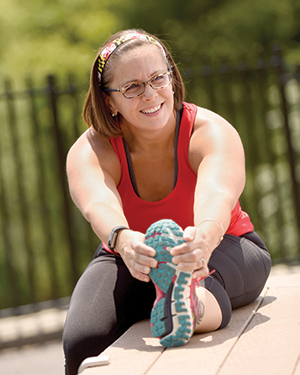Specialized Care for Athletes and Active Individuals

Stacy Bisnette started running at the age of 40 after moving to Columbia, Maryland from Massachusetts. The health and wellness coach had exercised on and off for years, though she had never enjoyed running. But, wanting to get outdoors and get some exercise, she decided to give it another try.
“I quickly realized that, in this area, running is a great way to meet other people,” Bisnette says. “As a newcomer to the community, establishing new connections was important to me. So, I joined a running club for women called Moms RUN This Town.”
Soon she was making new friends while exploring Columbia’s many parks and trails with other running enthusiasts. “I was doing some pretty long runs several days a week and was getting serious about signing up for some races,” she notes. “Then I started to have heart palpitations when running and the more I ran, the worse they got.”
Concerned that she might have a heart condition, Bisnette mentioned the palpitations to one of her fellow runners, Sharon Swencki, MD, a physician in the Emergency department at MedStar Union Memorial Hospital. “She suggested I make an appointment with a sports cardiologist who had just joined MedStar Heart & Vascular Institute at MedStar Union Memorial,” Bisnette says.
Bisnette made an appointment with Ankit B. Shah, MD, MPH, director of the newly created MedStar Sports & Performance Cardiology Program at MedStar Union Memorial, the first program of its kind in the Baltimore and Washington, D.C., region and one of only a few like it in the United States.
Dr. Shah, a runner himself, is a graduate of the only sports cardiology fellowship in the country.
“Sports cardiology is an emerging subspecialty of cardiology that fills a void in the care of athletes, both recreational and professional, as well as active individuals with cardiovascular disease or symptoms,” Dr. Shah explains. “Sports cardiologists specialize in providing comprehensive cardiovascular care to these individuals, including the assessment of cardiovascular symptoms, such as chest pain, palpitations, shortness of breath, and decreased exercise tolerance.”
The diagnostic evaluation of active people with symptoms is done in the context of the individual’s age, risk factors, and sport with the aim of reproducing symptoms through tailored exercise testing or ambulatory monitoring. This helps clinicians distinguish the cause of the symptoms.
During Bisnette’s initial consultation, Dr. Shah took a comprehensive medical history and administered tests, which included a stress test and an echocardiogram (ECG). “He then told me that I didn’t have to stop what I was doing, which was a relief. What he did have me do is wear an ambulatory cardiac monitor, a small patch that affixed to my chest to record my heartbeat whenever I had symptoms during my runs,” says Bisnette.
“It is vital for those caring for athletes and active individuals to have a sound understanding of the cardiovascular demands of exercise and be able to differentiate healthy physiologic cardiac changes from those caused by a heart condition. This type of monitoring is one way we are able to gather the right information to be able to do that,” says Dr. Shah.

“Athletes or active individuals may not present the same way as their sedentary counterparts. They may only experience symptoms or limitations at peak exercise, and their symptoms may be subtle, such as an inability to maintain prior race paces,” he adds. “In addition, the interpretation of ECGs and cardiac testing in athletes must take into account that what may look different or abnormal in a non-athlete might be a normal finding in an athletic individual.”
The good news for Bisnette was that her symptoms were simply the result of her body appropriately responding to her increased level of activity and her workup did not reveal any concerning findings. She is currently training for the Marine Corps Marathon, which is later this month, and will be running to raise money for Autism Speaks®. “I felt so much better after seeing Dr. Shah,” Bisnette says. “It was definitely worth it and I highly recommend him.”
“More people than ever before are becoming active and the level of participation in running events such as marathons continues to grow,” Dr. Shah says. “We offer customized treatment plans and exercise prescriptions that allow athletic and active individuals of all ages and athletic aspirations to safely continue in their endeavors with the ultimate goal of keeping them active and safe.”
For more information on the MedStar Sports & Performance Cardiology Program at MedStar Heart Vascular Institute, call 410-366-5600.
This article appeared in the fall 2018 issue of Destination: Good Health. Read more articles from this issue.
Learn More
For more information on the MedStar Sports & Performance Cardiology Program at MedStar Heart Vascular Institute, call 410-366-5600.
OUR SERVICES
MedStar Sports & Performance Cardiology provides comprehensive cardiovascular care and evaluation for athletes and active individuals of all ages and levels. This includes:
- Determining sports eligibility through pre-participation cardiac evaluation
- Evaluating potential cardiac symptoms
- Managing athletes who have a confirmed cardiac diagnosis
- Assisting with return-to-play decision-making
- Working with athletes to optimize performance
- Providing preventive cardiac care and evaluation of healthy individuals









